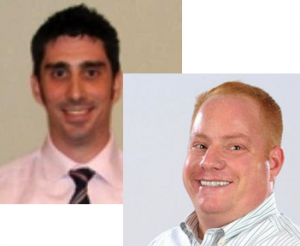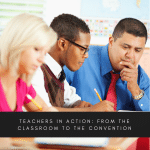“The world as we have created it is a process of our thinking. It cannot be changed without changing our thinking.” Albert Einstein
[fusion_builder_container hundred_percent=”yes” overflow=”visible”][fusion_builder_row][fusion_builder_column type=”1_1″ background_position=”left top” background_color=”” border_size=”” border_color=”” border_style=”solid” spacing=”yes” background_image=”” background_repeat=”no-repeat” padding=”” margin_top=”0px” margin_bottom=”0px” class=”” id=”” animation_type=”” animation_speed=”0.3″ animation_direction=”left” hide_on_mobile=”no” center_content=”no” min_height=”none”]
I will say it: it is difficult to be a change agent in the education profession. Public education in the United States has evolved over the last century into a behemoth of entrenched thinking and practices, punctured every decade or so by political intervention that impacts it in new and unforeseen ways. Variations on the public education system, in the form of private, charter, or other types of schools often suffer from the same entrenchment. Every year, teachers are introduced to some new “silver bullet” policy or procedure they are expected to implement, often with the ensuing consequence of their school or district never following up and simply introducing a new one the next year. In that environment of fake change constantly introduced on top of longstanding lack of true change, it is no wonder teachers often throw up their hands and just try to ignore it all. But if we are honest, that won’t ever be the answer.
Those who dare to step out of their proscribed roles in the classroom to reach for something more for their students or their colleagues are often looked upon with suspicion or fear. But those change agents are the ones who truly seek the positive transformation of our profession. Dozens of those change agent educators were encouraged and empowered last week during a workshop at the ECET2 Conference in Seattle conducted by Barry Saide (@barrykid1) and Dan Cullen (@danielcullen74). The session was called “Utilizing Social Media to be a Change Agent.” Saide is a 5th Grade teacher in Bernards Township School District, and Cullen is a principal in the Alpha Public School District, both in New Jersey. Their workshop was a revelation for many of the teachers in the room, including me.
From the start, Saide and Cullen were clearly good friends and energized educators. They brought both those qualities to their workshop and delighted and uplifted the participants with their dynamic style of story telling and facilitation. They began by telling the story of how they met: two educators in very different environments, and yet through the network of Twitter, Cullen found Saide and asked him to share his expertise. Yet, this session wasn’t really about social media. It was about what it truly means to be a change agent and a leader in education – the use of social media is only a tool in that quest. Cullen pointedly noted that if Saide hadn’t been willing to network and share his expertise in the social media community, Cullen would not have been able to find him. And Saide then added if Cullen hadn’t been willing to admit he needed to learn some things to be a better administrator and leader, he wouldn’t have been on the lookout for that connection. This intro got to the crux of the workshop: Being a leader and change agent in education means that prior to using tools like social media, true leadership grows out of the rich soil of Relationships and Fellowship… the exact same way we engage our own students.
Saide and Cullen then walked the participants through several different versions of what “leadership” means in order to get us to think deeply about our own practices and behaviors. We learned from Simon Sinek, discussing the concept of the power of vulnerability in leadership: “you are either a leader or you’re not a leader… real leaders instinctively eat last.” Cullen then shared with us about how deeply moving it is to be in a profession where the adults would literally throw themselves on top of children to protect them, and how we have unfortunately witnessed that time and again. But then he asked us to consider our own leaders – would they quickly throw themselves on us to protect us when crisis happens in our school or district? We are very lucky if we have leadership like that, and if we don’t, we need to be those leaders. Otherwise, transformational change can’t happen. As Saide noted, “standing up is laying down for your students.”
The workshop then led us into some deep reflection on the concept of a leader and change agent’s best quality: vulnerability. We must be willing to admit that we “don’t know what we don’t know,” and approach opportunity with vulnerability and compassion. True connection only happens as a result of authenticity, and so we must “let go of who we think we should be in order to be who we are.” Once we do that, we will find a network and community full of other educators like us, ready and willing to work for change. The opportunity for reflection on whether these qualities exist in our lives and our practice was invaluable as the session engaged us in thinking about the difficulty, yet essentialness, of vulnerability in leadership.
It won’t be easy. Change agents are often seen by others as people who are hard to control, or “instigators;” they are intimidating and they are presumed to be angling for glory. And yet, as Saide and Cullen showed us, the reality that true change agents know is that change changes you. When you are a change agent, you will be a better teacher, friend, partner and person in all of your communities. Not everyone will like you and not everyone will see what you are doing as a good thing. But though you see and understand the status quo, you don’t live there. And your intentional determination to uplift this profession through your own increased understanding and leadership will pay off for your students and your colleagues. When we finally reached the social media aspect of the workshop, it almost seemed unnecessary. Approaching the creation of social digital networks eventually becomes an intentional and purposeful way to learn and expand your own knowledge when you step into the role of teacher-leader. The connections happening throughout the array of online social networks are transforming into real life collaborations because teachers are beginning to take the lead.
If we want what is best for the children growing into this new 21st century, we have to be willing to seek out and be part of lasting transformation in our profession. That means educator leaders looking beyond just their classroom to networks and connections with colleagues beyond the boundaries of their immediate environment. It means moving from the fixed mindset of resistance and negativity to the growth mindset of change and possibility. I truly believe that it will be teacher voices and teacher-leaders who will be the true difference for our field, and it was empowering to receive guidance from two of those teacher-leaders in this workshop.[/fusion_builder_column][/fusion_builder_row][/fusion_builder_container]





